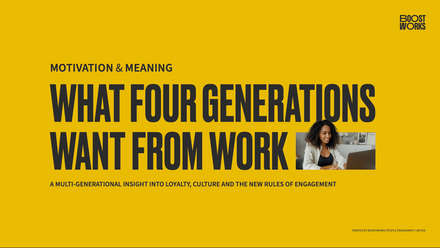How YBS tackled financial wellbeing head-on with an open, honest company culture

Eroding the stigma
Finances can be a topic of contention which many are unwilling to discuss through a lack of trust or fear of being judged. Pretty posters and ‘dry’ communications just aren’t going to encourage more open dialogue about financial wellbeing. For many organisations it is the culture that needs to shift to take away the stigma and shame in participating in financial wellness programmes to one where it is encouraged to share experiences and accept help. One such organisation that has managed to do just this is Yorkshire Building Society (YBS).
YBS case study
For YBS, helping its colleagues to have greater control over their own finances aligns with its core purpose as a building society, while employing colleagues who are ‘financially fit’ makes sound business sense. With this in mind, in late 2017 the organisation undertook some research to understand colleagues' financial health. The survey, which was completed by 1,000 colleagues - a quarter of the employee base - suggested colleagues were experiencing financial challenges. The findings include:
- One in 10 colleagues said they struggle to sleep due to financial worries;
- 37 per cent said they have less than £500 in savings leaving them vulnerable in case of an emergency; and
- 98 per cent would not speak to a manager or trusted colleague about their financial worries.
Taking control
The research identified a need for an ongoing financial wellbeing programme and the first wave of this began in April 2018. The first campaign was around ‘Taking control’ - focusing on encouraging colleagues to take greater ownership over their own financial wellbeing. This included education and access to tools to help colleagues improve their understanding of their own financial health. YBS also encouraged employees to share real-life stories about their financial situation. By taking steps to better understand colleagues’ financial concerns and then encouraging discussions around financial health, the associated stigma is slowly being eroded.
Leading from the top
Leaders are also key to eradicating any shame associated with financial health. Leaders who lead with humility, engender trust, provide mentorship and connect with their teams, will be more able to identify people who are struggling and will be better positioned to empathise with their financial situations. It’s therefore important for companies’ leadership teams to have the right attributes, allowing for open and honest discussions, and perhaps even starting-up conversations themselves. Leaders’ participation and sponsorship of financial wellbeing programmes reinforces that financial wellbeing has support from the top, and that anyone can experience financial worries.
Tailored approach
And while financial wellbeing is important to all employees regardless of age, each generation’s financial worries may be different and so employees shouldn’t be approached in a ‘one size fits all’ manner. With millennials now making up the largest part of the workforce as baby boomers retire, we must acknowledge that the subject of financial wellbeing needs to be tailored for different audiences.
As a so called ‘young person’ myself, it is easy to see how the stresses of large student debts, the changing employment landscape and the struggles to get onto the property ladder, can affect physical and mental wellbeing, as well as engagement and productivity in the workplace. Such financial concerns may not be the same for the older generations who may be more concerned about their retirement packages, for example, and so take this onboard when creating employee wellness programs.
The bottom line is that financial wellbeing should never be shied away from. It must be addressed head-on in a way that encourages buy-in and participation from the top of the organisation down. And any initiative must be based on an understanding of people’s financial challenges and tailored to the needs of the different generations – a ‘vanilla’ approach will simply switch people off!
This article is provided by O.C.Tanner.
*Statistics taken from O.C. Tanner’s 2018 Global Culture Report
If you'd like to further develop your knowledge about employee wellbeing, a day at the Employee Wellbeing Congress on 20 June in London, is the essential event for you.
https://www.employeewellbeingcongress.co.uk
Supplied by REBA Associate Member, O. C. Tanner
The worldwide leader in employee recognition solutions that help people thrive at work.







